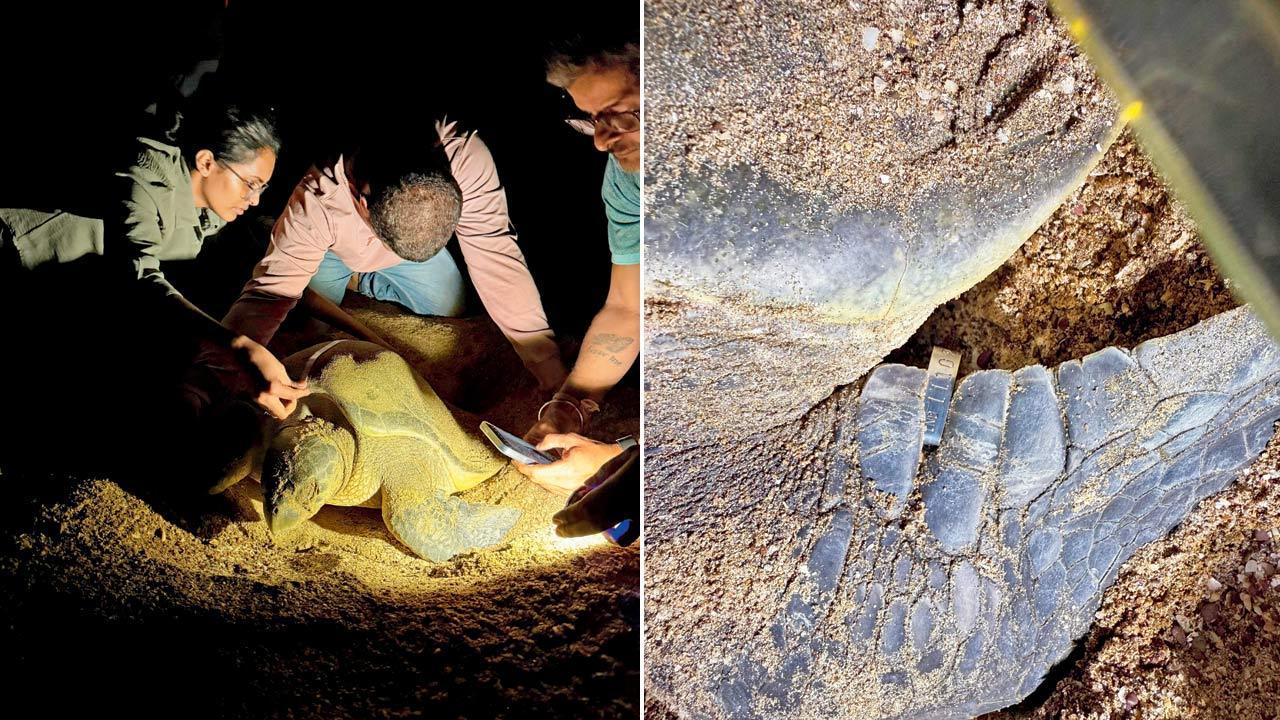Flipper tags with unique numbers help scientists monitor nesting patterns and travel routes; a WII research assistant working closely on the project told mid-day that each flipper tag has a unique number

WII officials tag an olive ridley turtle; (right) The flipper tags with the unique number
After tagging olive ridley turtles with flipper tags on the beaches of Ratnagiri, the Wildlife Institute of India (WII) has accelerated efforts to do the same in Sindhudurg, Konkan. A WII research assistant working closely on the project told mid-day that each flipper tag has a unique number, which helps researchers study turtle population estimates, track their travel patterns, and determine whether they return to the same beach in the same season or after a gap.
As part of this initiative, WII aims to tag a total of 500 olive ridley turtles visiting Maharashtra’s coastline, and the process is already underway.
WII Research Assistant Nidhi Mhatre said, “We have already begun the process, and metal tags are fitted on the front flippers or either the left or right flippers of olive ridley turtles when they come to nest. For Maharashtra, 200 tags have been allocated to Ratnagiri district, 200 to Sindhudurg district, and 100 to Dahanu district. In Ratnagiri, 30 olive ridley turtles have been tagged on Guhagar beach, one on Velas beach, and two on Anjarle beach. In Sindhudurg, we have tagged four turtles so far. This research will help us understand their inter-nesting behaviour, how far they travel, and whether they return to the same nesting site within the same season or in the future.”
The Ministry of Environment, Forest & Climate Change has developed a National Marine Turtle Action Plan (2021-2026) to conserve marine turtle species and their habitats. The plan aims to reduce threats to turtle survival, enhance research and monitoring, raise awareness and education about conservation, promote sustainable ecotourism for coastal communities, and strengthen national, regional, and international cooperation.
Action plan
“Indian coastal waters support five of the world’s sea turtle species: the olive ridley (Lepidochelys Olivacea), green (Chelonia Mydas), hawksbill (Eretmochelys Imbricata), leatherback (Dermochelys Coriacea), and loggerhead (Caretta Caretta). These species are protected under Schedule I of the Wildlife (Protection) Act, 1972. India is home to the largest known nesting population of olive ridley turtles. Except for loggerhead turtles, the other four species (leatherback, hawksbill, green, and olive ridley) nest along the Indian coastline and islands.”
The report also states that approximately 40,000 to 11,00,000 turtles nest on Indian beaches annually, though nesting numbers vary each year.
Additionally, the success of sporadic nests has been declining due to predation and habitat degradation.
According to forest department officials, there are six nesting beaches in Sindhudurg, four in Raigad, and 13 in Ratnagiri. The nesting season runs from November to March each year.
Turtle nesting facts
A female turtle lays between 100 and 150 eggs at a time. '
The eggs take 45 to 55 days to hatch.
Did you know
Sea turtles play a crucial role in maintaining ocean ecosystems. They help sustain seagrass beds and coral reefs, contribute to nutrient cycling, and provide habitat for other marine life. A decline in sea turtle populations weakens these essential functions, affecting overall ocean health. Protecting and restoring sea turtle populations is vital for maintaining balanced marine ecosystems.
 Subscribe today by clicking the link and stay updated with the latest news!" Click here!
Subscribe today by clicking the link and stay updated with the latest news!" Click here!








